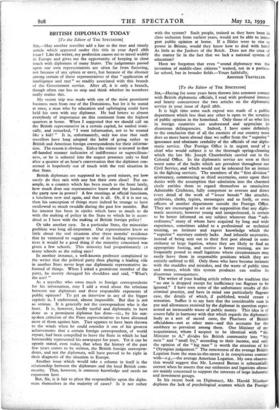BRITISH DIPLOMATS TODAY
[To the Editor of THE SPECTATOR] SIR,—May another traveller add a line to the true and timely article which appeared under this title in your April 28th issue? Like the writer, my profession causes me to travel widely in Europe and gives me the opportunity of keeping in dose touch with diplomats of many States. The judgements passed upon our own representatives are often far from flattering, not because of any spleen or envy, but because of the absence among certain of these representatives of that " application of intelligence and tact " so readily associated with this branch of the Government service. After all, it is only a branch, though often one has to stop and think whether its members really realise this.
My recent trip was made with one of the most prominent business men from one of the Dominions, but let it be stated at once, a man who by education and upbringing could have held his own with any diplomat. He had letters to almost everybody of importance on this continent from the highest quarters at home. When I suggested that we should call on the British representative in a certain capital, he smiled ironi- cally, and remarked, " I want information, not to be treated like a kid! " It is, unfortunately, only too true that such travellers have long adopted the habit of going rather to British and American foreign correspondents for their informa- tion. The reason is obvious. Either the visitor is treated in that off-handed manner indicative of indifference or supercilious-' ness, or he is ushered into the august presence only to find after a quarter of an hour's conversation that the diplomat con- cerned is hopelessly out of touch with the real situation in that State.
British diplomats are supposed to be good mixers, yet how rarely do they mix with any but their own class! For ex- ample, in a country which has been much to the front lately, how much does our representative know about the leaders of the party now in power? A few meetings at official functions, a luncheon now and again, and that is all. Or, if it is not so, then his conception of things must indeed be strange to have swallowed so much twaddle during the past few months. But his interest has been in circles which have as much to do with the making of policy in the State to which he is accre- dited as I have with the making of British foreign policy !
Or take another case. In a particular State, the minorities problem was long all-important. Our representative knew so little about the real situation after three months' residence that he ventured to suggest to one of its leading representa- tives it would be a good thing if the minority concerned was given a few schools. This minority had proportionately rs many schools as the ruling race!
In another instance, a well-known professor complained to the writer that the political party then playing a leading role in another State never kept our diplomatic representative in- formed of things. When I asked a prominent member of the party, he merely shrugged his shoulders and said, " What's the use? "
As a traveller who owes much to foreign correspondents for his information, may I add a word about the relations between our diplomats and these responsible exponents of public opinion? To get an interview in any of the bigger capitals is, I understand, almost impossible. But that is not so serious. It is generally not the correspondent who is the loser. It is, however, hardly tactful and diplomatic to have done as a prominent diplomat has done—viz., by his out- spoken criticism of the Press representatives to have alienated most of them against him. Tact appears to have been thrown to the winds when he could consider it one of his greatest achievements that a certain foreign correspondent, of world repute, had been compelled to leave the State in which he had honourably represented his newspaper for years. Yet it can be openly stated, even today, that when the history of the past few years comes to be written, the British foreign correspon- dents, and not the diplomats, will have proved to be right in their diagnosis of the situation in Europe.
Another issue which would take a column in itself is the relationship between the diplomats and the local British com- munity. That, however, is common knowledge and needs no expansion here.
But, Sir, is it fair to place the responsibility upon the diplo- mats themselves in the majority of cases? Is it not rather
with the system? Such people, trained as they have been in class seclusion from earliest years, would not be able to inter- pret public opinion at home. If a Hitler were to rise to power in Britain, would they know how to deal with him? As little as the Junkers of the Reich. Does not the crux of the matter lie in the fact that we lack a national system of education?
Have we forgotten that even " sound diplomacy was the invention of middle-class citizens " trained, not in a particu- lar school, but in broader fields.—Yours faithfully,
ANOTHER TRAVELLER.


















































 Previous page
Previous page